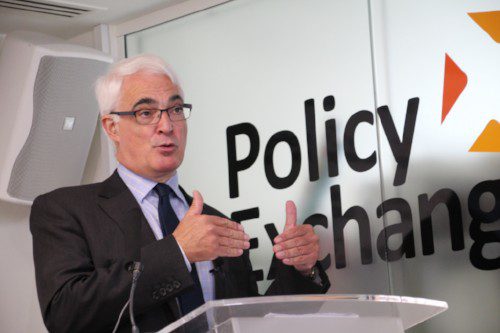With Lord Darling’s passing this week, the country has lost a great public servant. As the occupant of Number 11 between 2007 and 2010, Lord Darling was Chancellor during the most acute financial crisis that the United Kingdom had confronted in a century. His response to that event won him the respect and esteem of people of all political creeds. His legacy has shaped the environment for every Chancellor since.
It is hard to remember just how close to the brink Britain’s financial system came in those momentous months in 2008. Financial collapse, the decimation of lives and livelihoods – these were the stakes for Darling in those momentous months in 2008. The recent debates over orthodoxy only highlight the depths of Darling’s achievements – for he achieved the difficult feat of overriding economic orthodoxy whilst working closely with the Bank of England, Financial Services Authority – and the banks themselves.
The recapitalisation of the banks and the quasi-nationalisation of RBS and Lloyds would have been unthinkable in normal times. He injected emergency liquidity and provided a significant fiscal boost, with the deficit rising to its highest level in peacetime, breaking the Treasury’s own fiscal rules. He began the programme of reform of financial regulation that the Coalition would later build on. The lesson learned – that extraordinary times require extraordinary measures – set a precedent for future UK governments. Would the Conservative Government have been as ready, during the COVID-19 pandemic, to implement radical measures such as furlough, had Darling not blazed the trail fifteen years before?
He handled the crisis, famously, with calmness and aplomb, qualities that stood him in good stead whether with his Cabinet colleagues, or in convincing the bond markets that he would be able to get the deficit under control. The characteristics that, as Transport Secretary, had twice won him the accolade of ‘Britain’s most boring politician’ made him exactly the man to take the helm of the economy during a financial crisis. He appeared to some as first and foremost the resolver of conflict: softly-spoken, mild-mannered politician and capable of lowering the temperature in most rooms. Yet beneath it all was a core of absolute resolve, born of a steely self-confidence married with an intellectual rigour that enabled him to defy, where needed, the clamour within his party – and even the Prime Minister of the day himself.
For unlike many who avoid conflict, Darling was a man of great integrity, and was guided by a strong set of moral convictions. It meant that when he believed something needed to be said, considerations of convenience and mollification were secondary to doing what in his view was right. Civil Servants who worked with him report that he never shirked responsibility, but instead was a man with not only the intellectual ability to grasp the complexities of the most difficult economic crisis Britain had faced in decades, but with the steel to make the right decisions – and stick to them. Both his warning of prescient financial crisis in 2007, and his willingness to cancel planned spending plans in the wake of events, bear testimony to a man who believed in doing what was right, not was popular.
Darling’s final – and, we may hope, longest lasting – legacy is the preservation of the Union. As Chair of the Better Together campaign during the referendum on Scottish Independence he had a remarkable ability to speak to those things that all of us in Britain share in common.
Darling was the first Secretary of State I ever served under. As a fresh-faced civil servant joining the Department of Trade and Industry straight from university, he was everything one had hoped a Cabinet Minister would be: capable, authoritative and committed, a leader one could be proud of whatever one’s politics. And, as I would later learn at Policy Exchange he was an immensely generous man – generous with his time and generous with his intellectual capital. His four years’ experience in charge of the Department for Transport were brought to bear on the think tank’s transport research in 2021. He appeared on Policy Exchange’s platform many times, including last year when he spoke on a panel concerning proposals for road pricing, and was gracious enough to lend his backing to a number of our reports, including on the importance of investing in capital and on the need for an economy-wide carbon tax.
Our country, then, has lost a remarkable political figure. Lord Darling represented the best of politics, and the history books will record that he had an immense bearing on this country in the first decades of the Twenty-First Century. He will be sorely missed.


